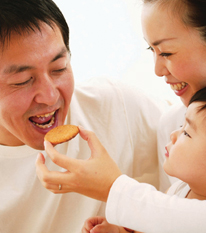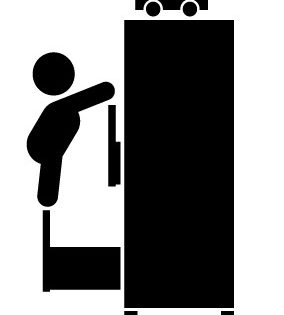“You know how the papers are hyping up the importance of teaching kids from young? Well, Jan just enrolled her son in this reading programme and it’s amazing. He’s only two and he can actually read!”
Farida smiles at her friend’s enthusiasm. Farida and her husband Jamal have been doing their homework too – they have spoken to people, visited websites and collected their fair share of brochures. The world is so competitive – the last thing they want is to have their child left behind.
Not too far away, Daniel sighs with frustration. All attempts to teach his daughter to converse in English have failed. “Problem is, Amy spends too much time with the maid,” he tells his wife. “She probably puts Amy in front of the TV all day! How can she learn anything like that?”
Raised by the family’s Indonesian maid, Amy only sees her parents before bedtime – that is, if they come home early and are not too tired to squeeze in a few minutes with her. They know they should spend more time with her but now is not the time. There is just too much to do. Maybe later.
Times have changed.We are more affluent, more educated, more exposed, more competitive, more mobile and busier than ever. Flip through the papers and read all about children’s increasing stress levels … sky-high divorce rates … overweight and obesity … deterioration of family values … social problems among teens … parents not spending enough time with their children …
Hardly sounds like good news for parents, does it? We recently sat down for a chat with a panel of experts in maternal care, education, nutrition, paediatrics, mental health and family development, who shared with us their views on what they are seeing on the parenting front today.
Right from the womb
– Associate Professor Dr Tan Ay Eeng Obstetrician & Gynaecologist, Obstetrical and Gynaecological Society of Malaysia (OGSM)
“Parents today expect higher standards of maternal care. Being more informed and aware, they ask many questions that are very relevant and they are more involved in the decision making process. Unfortunately, there is a downside to this – the overload of information has led to unnecessary stress and anxiety over possible problems with the mother’s and foetus’s health. Parents-to-be also tend to have unrealistic expectations of the pregnancy and delivery, assuming that everything will go perfectly.”
“While there is great concern with pregnancy and labour, there is low awareness among couples on contraception and family planning. Most women do not even go for prepregnancy health screenings. These are things couples should pay more attention to because they are part of the family planning process.”
“What’s for lunch, mom?”
– Associate Professor Dr Poh Bee Koon, Nutritionist, Nutrition Society of Malaysia (NSM)
“Children today are either being driven around or parked in front of the computer all day. The effects of a sedentary lifestyle are compounded by the fact that more families are eating out because they have no time to cook. Constantly eating foods with low nutritional value, for instance fast foods, has led to the rise of overweight and obesity among children”.
“A Nutrition Survey on 12,000 school children conducted nationwide by Universiti Kebangsaan Malaysia in 2002 revealed that 10% of children are overweight and 6% obese. Another study conducted in that same year on 3,114 preschoolers aged 4 to 6 years showed that 8.8% of them were overweight or obese. Our problem today is not just lack of nutrition but too much of it as well!”
“Supplements are another trend, especially among the well-to-do. Parents let their children gobble down Vitamin C tablets or multivitamins as if they were sweets. They do not realise that overdose may lead to negative effects – for instance, consistent overdose of Vitamin C tablets can lead to rebound scurvy if the tablets are stopped. Parents need to be more careful and get their doctor’s advice before giving their children supplements.”
How Malaysian families are changing
– Dr Anjli Doshi-Gandhi Director of Family Development, National Population and Family Development Board Malaysia (NPFDB)
“70% of Malaysian families today are nuclear families. Unlike families in the past who had the support of the extended family, young couples now function more independently.”
“The absence of support can be challenging especially with the rise of dual-career families. About 46.7% of the women are in labour force, leading to issues such as the sharing of household responsibilities, childcare needs and caring for the older generation. One phenomenon is the ‘sandwich generation’ where couples have to look after their young children and aging parents due to longer life expectancy. This is stressful, especially on top of the demands of working life!”
“Families today are afflicted with what we call a ‘time famine’.While they believe in the importance of family values, many are struggling to find a balance between work and family life. But how can you communicate and instil values in your children if you do not spend quality and quantity time with them? A Malaysian Family & Population Survey conducted in 2004 showed that fathers tend to communicate less with their children than mothers. But the days of the father as the breadwinner and disciplinarian are over.With more mothers in the workforce, both parents have to be equally involved and committed to child-raising. Both must invest time to teach their children values like responsibility, honesty and respect from young.”
Happy, healthy & safe
– Dr Yong Junina Fadzil Consultant Paediatrician, Malaysian Paediatric Association (MPA)
“Parents today are most concerned with things pertaining to their child’s growth: Is my child growing and developing normally? What nutrition can I give to optimise his growth? What kinds of toys can I buy to improve his development?”
“Being more informed and aware of what is available in the market, they are no longer content to sit back and let the doctor decide for them. They want to have a say in all decision-making – from immunisation to nutrition to development. On the other hand, while parents are more informed and aware, they are also less involved in the daily upbringing of their children. Many working parents leave the childcare responsibilities to the maid.”
“Some parents are beginning to wake up to safety issues such as the need to use child car safety seats, the dangers of baby walkers and lead paint, as well as the importance of age-appropriate toys. However, most are generally unaware and will not really opt for a particular brand for its safety features. For instance, you should not purchase a toy that is meant for a child 18 months and above if your child is only 6 months old. Some parents do that, thinking that their baby is intelligent enough to play with it. But it is not a matter of intelligence but safety – the toy is probably too small and is therefore, a choking hazard.”
Early childhood education and care
– Datin Radziah M. Daud SRN SCM President, National Association of Early Childhood Care & Education Malaysia (NAECCEM)
“Parents now are more aware of the benefits of early childhood education and care, thanks to the efforts of the Ministry of Women, Family & Community Development and the latest ‘Every Child is Precious’ or Permata Negara project headed by the Deputy Prime Minister.”
“According to a report prepared by the Permata Negara committee, children exposed to proper early childhood education and care are more likely to have 7 to 10 months advantage in reading and maths, to finish high school, to be better equipped to meet future educational demands and to be employed.”
“Early childhood education and care is not just about academic achievements. It is about providing children with developmentally appropriate experiences from birth to 6 years old that will enhance every aspect of their growth and development. It is about building character, instilling and nurturing values. So it is advisable that we lay the right foundation during this crucial time.”
“Most parents today are still very exam-oriented but with more exposure and the right parental skills, more will begin to understand the importance of early childhood education. Most importantly, parents must remember: learning has to be fun!”
The mentally healthy child
– Dr Yen Teck Hoe, Consultant Psychiatrist, Vice-President, Malaysian Mental Health Association (MMHA)
“Mentally healthy children are able to express how they feel, they feel good about themselves, are able to love and trust others and are able to cope positively with the demands of life.”
“To raise a mentally healthy child, parents must first understand their role as a parent and accept full responsibility for this role. Many parents today tend to treat their children like friends, but children are not your peers.When you treat your child like a friend, chances are, your child will not respect you or listen to what you say. Parents must first be parents! While this does not mean that you take an authoritarian approach, boundaries and rules must be set, discipline must be enforced consistently.”
“Many parents today also have unrealistically high expectations of their children and are particularly obsessed with academic achievements.While wanting their children to be successful is not wrong in itself, it can place a lot of pressure on the child and may even be detrimental to a child who is not able to meet these expectations.”
Loving care & attention
– Pn Norsheila Abdullah President, Association of Registered Childcare Providers, Malaysia (ARCPM)
“Children aged four or five are already being sent for reading classes, piano lessons, taekwondo classes … the list goes on. By the time they are seven, their schedules are full. Instead of giving children the freedom to learn through play, they are made to attend structured classes, do homework and even sit for tests!”
“It is a fast-paced, competitive world out there and parents are understandably anxious that their children excel. But what about nurturing the child? To nurture a child is to provide loving care and attention, to create an environment that encourages him to explore and learn through play. Once a child feels safe and nurtured, he will be more confident when facing challenges.”
“Nurturing must start from the home and with the parents. Parents must understand and take on this role fully and not rely on their child’s caregivers, preschool teachers or the maid.”
So … what’s a Positive Parent to do?
– Dr Zulkifli Ismail President, Malaysian Paediatric Association & Chairman, Positive Parenting Management Committee
Just as there is no ideal child, there is no ideal parenting “method”. However, a chat with Dr Zulkifli Ismail, Consultant Paediatrician, President of Malaysian Paediatric Association and Chairman of Positive Parenting Management Committee, revealed that there are some principles that can help guide parents through these challenging times:
Take a holistic approach
A holistic approach means to be aware that your child’s development is an extremely complex process that encompasses not just physical and cognitive development, but language and communication, socio-emotional development, even moral and spiritual growth. Each aspect is important and deserves equal attention. Take time to understand these different aspects of your child’s total development and find out what type of developmentally appropriate activities or experiences you can provide to nurture them.
Listen & discern
Everywhere you turn, you are besieged with information on every parenting topic. But not everything you read is right (or even safe) for your child. This is especially true with websites that can be published by practically anyone with a little time on their hands.
“Listen to your child,” says Dr Zulkifli. “Learn from him. Do not just blindly follow techniques somebody else recommends. Pay attention to your child’s verbal and non-verbal messages. From there, you will be able to discern what he really needs and wants.”
Devote time
“Positive parents are able to strike a healthy balance between their family and their work,” says Dr Zulkifli. “We talk about quality time with our children but nobody can tell you what quality time means. As long as the time you do spend with your child is memorable, that is good enough. It can be just as simple as painting a picture together or going out for a meal.”
Be flexible
Not only are we in an ever-changing environment, we are parents of a rapidly growing and developing child whose capabilities and level of understanding are changing every single day. Parents need to evolve and adapt to the needs of the environment and the child. Honestly evaluate your parenting style from time to time and be willing to admit that it is time for a change when (not if ) the time comes.
Keep learning
New trends, issues, methods and developments are occurring at breakneck speed every day. To be an effective parent, you need to be well-informed. Speak to other parents, listen to the child experts and read as much as you possibly can. Being aware of the issues around you as well as the current best practices in parenting will go a long way in sharpening your parenting skills.
Being a parent – especially for the first time – can be quite a challenge and you have to learn a lot very fast. But children are naturally resilient. As you play your role and give them care, love and security, you will find that they can cope well in any situation.







Comments